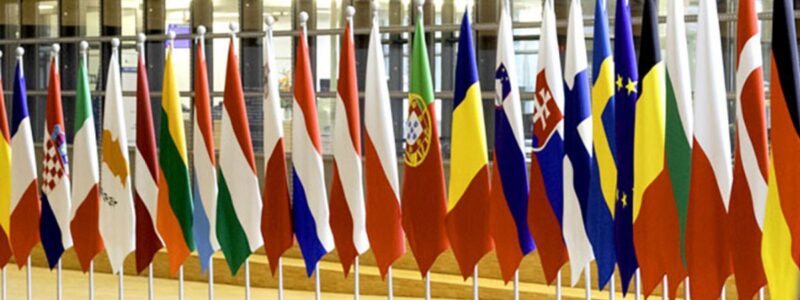
This summer, more than ever since Russian troops crossed the border in February 2022, Ukraine is in dire need of the strongest possible reaffirmation of Western diplomatic, economic, and security support.
Military aid from the United States and European allies is increasing again, but wars are not won on the battlefield alone. Political and diplomatic support for Ukraine also needs to be strengthened. The twin events of this summer Ukraine Peace Summit in Switzerland in June and the NATO 75th Anniversary Summit in Washington, DC, in July provide an unprecedented opportunity to do so.
The summit on June 15-16, organized by the Swiss government, may be the last opportunity this year to draw the attention of the broader international community to the global implications of the conflict in Ukraine. As it did before and after the war broke out, the Biden administration could provide momentum both for more urgent diplomatic work to achieve peace and for consolidating military support for Ukraine by allies a few weeks later at the NATO summit.
The situation in Switzerland has been complicated. In recent months, the main goal of Washington and European capitals has been to provide financial and military support for Ukraine’s military operations. It took the White House seven months to overcome a blocking House of Representatives proposal to provide $60 billion in military aid to Ukraine. In Europe, Hungary withheld a €50 billion aid package for almost two months before agreeing to release it.
The lost time affected the course of the conflict. Russia used the winter months to prepare for a new offensive while the West debated and Ukraine’s weapons stockpile was depleted. There are now more than 400,000 troops on the ground in Ukraine, and Ukraine’s energy infrastructure and second largest city, Kharkiv, are under serious threat. On the international level, the diplomatic agenda has become overloaded, with the crisis in Israel and Gaza consuming the attention of the White House and other governments. The presidential and parliamentary elections in the US and Europe may lead to an atmosphere less favorable to providing assistance to Ukraine.
But it is at times like these that diplomacy and symbolism are essential and can remind us of what is at stake – and not just for Ukraine.
The conference in Switzerland is the most ambitious attempt to date to engage the world – not just Ukraine’s Western allies – in supporting an end to a conflict that has disrupted global energy and food supplies, threatened nuclear conflict, led to the world’s second largest refugee flow and resulted in hundreds of thousands of casualties.
To date, according to some reports, more than 100 countries and international organizations have committed to attend the conference, although Russia has not been invited to participate. Many countries may have different views on how this conflict can be resolved; many countries are eager to maintain ties with both Russia and Ukraine, despite the fact that they voted at the UN General Assembly to condemn the initial invasion. Ukraine, however, is aware of all the nuances.
In his June 2 speech at the Shangri-La Dialogue in Singapore, which brings together defense and other officials from the Asia-Pacific region, President Zelenskyy made it clear that Ukraine is “ready to listen to various proposals and opinions that will lead us…to ending the war and establishing a sustainable and just peace.” The Ukrainian government, together with Switzerland, has been working diligently on an agenda that can unite rather than divide international opinion.
This did not prevent Russia and its allies from perceiving the summit as a threat. At a meeting with the leaders of Indonesia, Singapore, the Philippines, and other Asian states, Zelenskyy in Singapore drew special attention to China’s efforts to dissuade countries from participating in the summit. China, along with Brazil, also proposed holding an alternative conference at a later date. Therefore, a strong position of Washington and key European allies is needed to strengthen international resolve at the summit.
Now we can draw parallels with February 2022. At the beginning of the war, visits to Kyiv by the president and cabinet of ministers, as well as President Zelenskyy to Washington played a crucial role in strengthening the US commitment to Ukraine in the popular imagination and in the eyes of allies and adversaries alike. They also sent an unequivocal message of political and diplomatic support for Ukrainians as they confronted and defeated an all-out Russian invasion to overthrow their government.
In June 2024, Ukraine will need that reaffirmation again, as Russia is once again confident in its goals. The stakes are still high: Ukraine, at least for the rules-based order that has endured for 70 years since World War II and the end of the Cold War, is the defining conflict of our era. A Russian victory would undermine all calculations by the United States and Europe about their own future security and prosperity and destroy the limits to violence between states around the world.
We have not yet reached that point, but Russia, China, and other countries that question the resilience of the United States are seeking to undermine international commitments to Ukraine. Ukrainians will regret that President Biden will not attend the summit in Switzerland, but he will meet with Zelenskiy in France on the sidelines of the 80th anniversary of D-Day in France. In addition, Vice President Kamala Harris, who will represent the administration, can work with German Chancellor Olaf Scholz, French President Emmanuel Macron, Canadian Prime Minister Justin Trudeau, and other world leaders in attendance to rally participants and send an unmistakable message at this critical moment: Ukraine is not alone.
P. Michael McKinley is a non-resident Senior Advisor at CSIS and former U.S. Ambassador to Afghanistan, Brazil, Colombia and Peru.